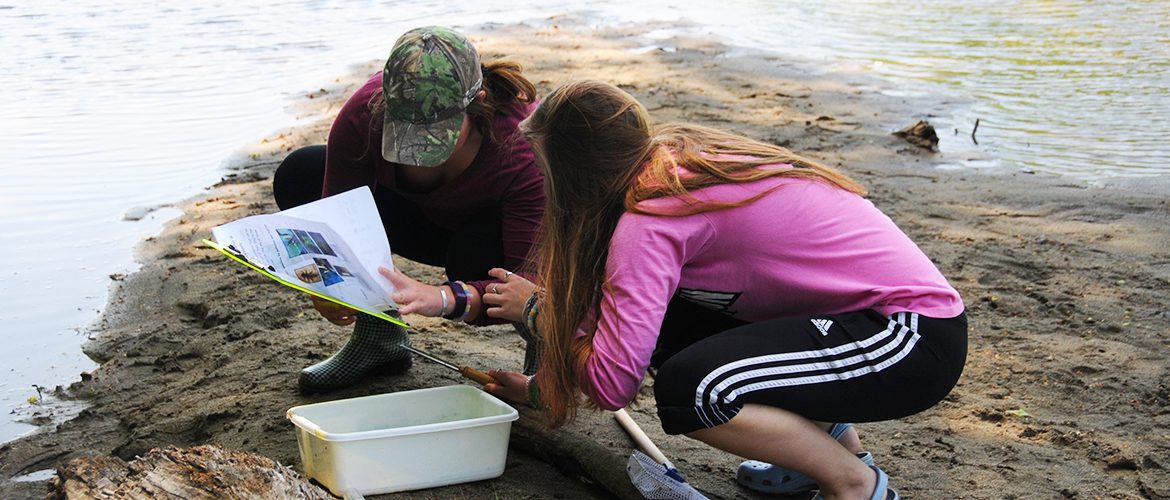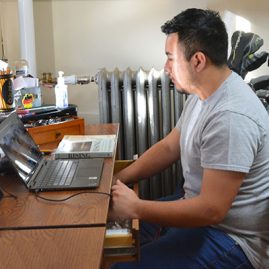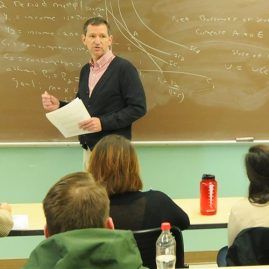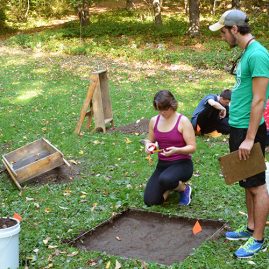In the University of Maine at Farmington Earth and Environmental Sciences program, you’ll become a member of a true scientific community — learning the techniques of field observation, measurement, sampling and analysis as part of your coursework.
Here, you’ll work side-by-side with your professors in classes and laboratories and also in the field conducting real-world research in our nearby forests, lakes, rivers, mountains and coastal settings.
The Earth and Environmental Sciences program engages you in a variety of in-the-field and in-the-lab investigations to help you better understand the past, present and future behavior of the whole earth system.
As an Earth and Environmental Sciences student you’ll also have opportunities for hands-on internship experiences. You’ll become proficient in doing and communicating science — even making presentations in public and scientific arenas.
See Earth & Environmental Science student Cameron McLaughlin (included in this three-student video) on why he chose Farmington
One Major – Two Concentrations
Our Earth and Environmental Sciences has two concentrations: Geology and Environmental Science. Both place a strong emphasis on fieldwork and hands-on experiences.
Geology Concentration
In the Geology concentration, you’ll focus on understanding the past and present processes that shape our planet and its resources. You’ll have field experiences at nearby sites and, during travel courses, at other geologically rich locations such as: Newfoundland, Ireland, Scotland and central Canada. Graduates can go on to careers in mineral exploration, water resource management, education and GIS analysis.
Environmental Science Concentration
In the Environmental Science concentration, you’ll take an interdisciplinary approach that’s flexible, and quantitative and offers the opportunity for greater specialization. You’ll gain a strong core in the natural sciences and mathematics and may select electives to allow for in-depth specialization in a specific discipline. Graduates can pursue careers in lake conservation, environmental impact and assessment, endangered species conservation, state park and marine resource protection, sustainable agriculture, air quality and energy resources or enroll in graduate studies.
Empowered to Effect Social Change
Whichever Earth and Environmental Sciences track you choose, you’ll leave UMF ready to tackle resource, energy, and environmental challenges of the 21st century. You’ll be empowered to be an environmentally literate citizen skilled at using scientific approaches to effect constructive social change.
Save more than $5,500 per year in tuition. This University of Maine at Farmington program qualifies for the NEBHE Tuition Break.
Through the NEBHE Tuition Break program, students from Connecticut, Massachusetts, New Hampshire, Rhode Island, and Vermont receive a $5,670 tuition discount on all UMF degree programs.
What Can You Do With A Degree in Earth & Environmental Science?
Data comes from the U.S. Bureau of Labor Statistics and other sources. Median Salaries for positions in Maine typically fall below those of other New England states.
UMF Named a 2024 “Top Green College” by Princeton Review Guide to Green Colleges: 2024 Edition
The Princeton Review Guide to Green Colleges: 2024 Edition provides a comprehensive measure of a school’s performance as an environmentally aware and prepared institution.
According to the Princeton Review, the schools that were selected for the Guide to Green Colleges all have exceptional programs, policies, and practices related to sustainability and the environment. The 2024 Guide features profiles of 522 schools
Environmental sustainability is woven into the fabric of Farmington, a leader in the region and an early adopter of energy-saving practices including recycling, renewable energy, and academic programs in Earth & Environmental Science and Geography & Environmental Planning. We are proud to be recognized by the Princeton Review for our dedication to an environmentally sustainable future.
UMF’s formal commitment to environmental sustainability began with the creation of the UMF Sustainable Campus Coalition in 2001. Its Green Vision Statement in 2006 provided the foundation for sustainable practices to be an integral part of campus management leading to the construction of several LEED-certified campus buildings, the signing of the American Colleges and Universities Presidents’ Climate Commitment, and recognition by the U.S. House of Representatives for UMF’s efforts in making a clean energy campus a reality.
In 2016, UMF completed a biomass heating plant that burns locally sourced wood chips to heat close to 85% of the campus with renewable biomass. The UMF heating plant is projected to recoup construction costs through energy savings in the first 10 years of operation and is reducing the University’s carbon emissions by 4,000 tons per year.
A second biomass boiler was added to the UMF Biomass Plant in the summer of 2023 to heat campus hot water during the warmer months in late spring, summer and early fall. Both units will continue to use locally sourced Maine wood chips in place of fossil fuel and in support of the local economy.
 UMF Named a Best Choice Colleges “Most Affordable Eco-friendly College”
UMF Named a Best Choice Colleges “Most Affordable Eco-friendly College”
Best Choice Colleges named the University of Maine at Farmington the #4 Most Affordable Eco-friendly College in the Nation in 2021-2022.
To decide the 50 Most Affordable Eco-Friendly Colleges, Best Choice Colleges consulted organizations such as the Sierra Club, U.S. News & World Report, and The Princeton Review to come up with American colleges and universities that have a solid reputation as “eco-friendly.”
From there, it consulted nearly 100 universities’ own websites to determine the annual undergraduate tuition. Finally, it ranked each university from lowest to highest annual tuition, in order to determine the 50 most affordable.
All of the schools on the list have unique structures or lifestyle characteristics that make them leaders in sustainability. They have all earned formal “green” ratings from one major agency or another, and most have been recognized by respected groups dedicated to protecting the environment
Whether you’re looking for an education in order to pursue a career in environmentalism, or are just interested in living a life of sustainability, Farmington is dedicated to the idea of sustainable living: a LEED-certified building, a sustainable biomass heating facility, geothermal wells for heating and cooling campus buildings, even an on-campus community vegetable garden. Here at UMF, you don’t need to spend a fortune in tuition and fees just to attend a responsibly eco-friendly college.
Contact Us
Office of Admissions
University of Maine at Farmington
246 Main Street
Farmington, Maine USA 04938-1994
tel 207-778-7050
fax 207-778-8182
TYY (via Maine Relay Service) dial 711
umfadmit@maine.edu










